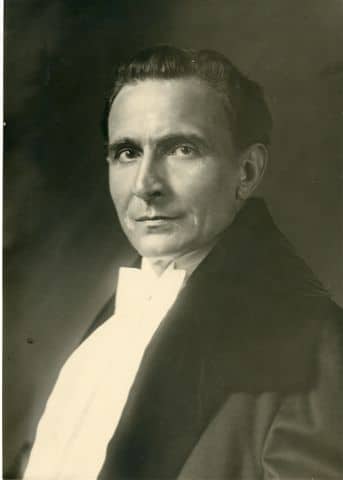Società Dante Alighieri in the Netherlands

Despite the fact that the Netherlands were never an important destination for Italian emigrants, local branches of the Società emerged thanks to the personal efforts of Romano Guarnieri (1893-1955). He studied Romance languages at the University of Groningen. He was appointed in 1926 as a special lecturer of Italian at the University of Amsterdam, and in 1934 as a special professor of Italian at the University of Utrecht.
Guarnieri is considered a highly controversial person. From the early 1920s, Guarnieri openly supported fascism and praised Mussolini’s ideals in Italian and Dutch newspapers and magazines. In 1927, Mussolini even appointed Guarnieri as acting consul of Italy in the Netherlands.
His support for the fascist regime took a very dark turn in his life when Mussolini adopted the antisemitic laws of Nazi Germany, followed by the German occupation of the Netherlands in 1940. This marked Guarnieri’s first break with fascism as his wife, Carla Simons, was Jewish. Guarnieri never supported any form of antisemitism. In 1943, Carla was arrested along with many other Jews. Using his connections, Guarnieri tried to have his wife released, for which he, rather ironically, used his reputation as an ardent supporter of the fascist regime. This could not save Carla from the fate that many Dutch Jews suffered, as she was deported a few months later to Auschwitz, where she died.
Following the end of WWII, Guarnieri was acquitted by the academic committee that had to judge whether he had been a collaborator during the war. He was reinstated as professor, despite the fact that many people still distrusted him due to his past allegiance to the Fascist Party, which he had denounced. After his retirement in 1952, Guarnieri returned to Italy, where he passed away. Despite his controversial history and tragic life, Guarnieri was of great importance to the study of Italian language and culture in the Netherlands, and La Dante would not have existed without his efforts.
Local chapters of La Dante were founded across the country between 1934 and 1939. Members of the society in the Netherlands are almost exclusively Dutch. Because of the fascist allegiance of the society, some committees ceased their activities and only resumed them after the Second World War.


La Dante Groningen
Committees of La Dante are found in many major cities across the Netherlands. The chapter in Groningen was founded on 1 December 1924 when Giovanni di Casamichela, the professor of Italian language and literature at the University of Groningen, initiated correspondence with the headquarters of La Dante. He was interested in founding a comitato in the city. He requested books for the establishment of a social library and financial assistance to promote the initiative and increase the number of members. The committee was named the Committee of Northern Holland, as it extended to the neighbouring provinces of Friesland and Drenthe. The first board of the committee was only provisional and had professor Di Casamichela as its president.
Since its foundation, the Groningen Committee has been interested in receiving books for its library. In the 1930s, the collection expanded rapidly. Prof. Giovanni di Casamichela donated some copies from his personal collection. Starting in 1931, the Roman Headquarters of La Dante gave the Groningen committee a subscription to various cultural and political magazines. In January 1933, the Central Office sent a copy of Mussolini's La Vita di Arnaldo and a year later the magazine Critica Fascista by Giuseppe Bottai, amongst others. Another 30 volumes were sent to the committee in September 1934, and in March 1935, Dr Augusto Garcia, a lecturer in Italian language and literature at the University of Groningen, donated 40 books.
Due to the war and for economic reasons, the number of committee members decreased in October 1940 from 24 to 8. The three remaining members of the Board of Directors decided to suspend the committee's activities and leave the library in deposit at the University of Groningen Library, ensuring its public use. In March 1941, the suspension of all activities was officially ratified.
In 1946, President Roos resumed contacts with the headquarters for the reconstitution of the committee, which took place in January 1947. The Roman headquarters granted new magazine subscriptions and sent four packages of books. Magazine subscriptions renewed again in 1949 and 1950.
There is no information on whether the collection was moved from the University Library to a different location by the time the Groningen committee was reinstated. Chapters of La Dante outside of Italy often do not have a permanent site. A special catalogue of the collection was published in 1930 with an appendix from 1950, available only in the Italian language. In its registers (journalen), the University of Groningen Library dates the first lease from La Dante in 1961.
In 1991, collection specialist Jelle Kingma published Kunst, cultuur en politiek in Italië 1920-1940, a collection of studies on the influence of Italian art and culture in the northern provinces of the Netherlands. At the same time, an exhibition on the subject was held at the Library.
Currently, the Groningen Comitato is composed of circa forty Dutch members who all share a great love for Italy. They meet regularly for small conferences on the Italian language and culture, while Valerio Cugia, the only Groningen member of Italian origin, hosts a literary salon at his house.
All things considered, La Dante Groningen and the Bibliotheca Italiana are testimony to the role of Italian culture and 20th-century fascism in the Northern Netherlands. The Bibliotheca Italiana remains an interesting collection for anyone interested in fascist art, politics and culture.
| Last modified: | 22 July 2024 3.45 p.m. |

